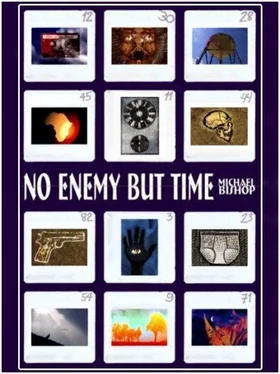Well, it may have been a miracle.
Fort Walton Beach, Florida, to Van Luna, Kansas
September to December 1985
WoodyKaprow was an enigma. He did not consider Florida home, but he paid so little heed to his physical surroundings that no other place in the world (with the possible exception of a marshy area in Poland from which his family hailed but upon which he had never laid eyes) could claim that distinction, either. He was truly at home only in his own mind. A civilian, he let his mind to the Air Force under the terms of a complicated military research-and-development contract. A bachelor, he was married to this work. A loner, he was surrounded by assistants. A genius (if you could trust the judgment of these often fuddled minions), when it came to literature, music, art, or the likely contenders in this year’s Super Bowl game, he had the attention span of a third-grader. Time—its properties, paradoxes, metaphysics, measurement, and maddening theoretical possibilities—was Woody Kaprow’s passion. It was his career.
A vocation that did not prevent him from misgauging the number of minutes it required to heat a frozen TV dinner. A passion that he could indulge while rinsing out a pair of socks, picking his nose, or attending committee meetings.
Kaprow, in person, was unprepossessing. A slender, middle-aged man with dark hair and eyes like bloated cocktail onions, he seemed younger than his years. (Joshua felt that this was because his ruling passion gave him a distracted, adolescent air, like a teenager in love with opera or astrology.) His clothes were always minimum-maintenance: dungarees, drip-dry shirts, chinos, turtleneck pullovers, jean jackets, sweatshirts, deck pants, and, occasionally, an orange, multizippered flight suit that he had purchased from a retiring fighter pilot. Even in the flight suit, however, he looked less like a military man than like one of the surviving members of the Flying Wallendas. Indeed, with his head cocked just so, his eyes afloat in the martini-bright waters of Abstract Speculation, he sometimes seemed to be walking a high wire invisible to mortal ken. At such times the jaunty, orange flight suit merely accentuated the incongruity of his metaphysical derring-do. A cough, a word, the slamming of a door would only infrequently shatter his concentration, but when they did, you could see him slipping from the wire and plummeting earthward like any other workaday Joe of average ambition, intelligence, and inspiration. Unprepossessing. Off the wire, almost—but not quite—a dullard.
Joshua had first met Kaprow in the mammoth Quonset hut given over to his workshop and laboratory.
The physicist had been lying flat on his back on a grease-monkey’s sled, apparently examining the chassis of an ugly, buslike vehicle that took up most of the floor space at the north end of the Quonset. Only Kaprow’s Converse tennis shoes were visible, their scuffed rubber toes pointing toward the skylight. Not the most awe-inspiring of the man’s attributes, these sneaker-clad feet, but Colonel Crawford knelt beside the bus and announced in a clear voice that White Sphinx’s newest recruit was awaiting Kaprow’s pleasure. Whereupon the physicist scooted out from under the bus, jumped up like a calisthenics instructor, and warmly, albeit distractedly, took Joshua’s hand. He looked back and forth between the colonel and Joshua as if trying to connect them to the work he had just been doing. Satisfied that neither visitor was a ghost or an importer, he smiled and slapped Joshua on the shoulder.
“Here you are,” he said. “My dreamfarer.”
“Alistair Patrick Blair thinks I’m his.”
“Actually,” Colonel Crawford put in, “you belong brain, belly, and balls to the U.S. Air Force.”
“Yes, massa.”
Kaprow slapped him on the shoulder again and smiled a sweet, lopsided smile. “A dreamfarer’s principal bondage is to his dreamfaring. All the others are secondary. Isn’t that so, Mr. Kampa?”
“Anything you say, sir.”
* * *
In September Blair was concluding his American Geographic Foundation lectures, which he had interrupted for two weeks in August to hold a series of meetings with officials of the departments of Defense and State in Washington, D.C. These meetings had produced—very quickly—an important agreement between the governments of Zarakal and the United States, a codicil to the recent treaties establishing American military bases in Blair’s homeland. Now, having fulfilled both his diplomatic and his paleontological obligations in the United States, he was returning to Marakoi. He stopped at Eglin to confer with Woody Kaprow and Joshua Kampa.
Hands thrust deep in the pockets of his boiler suit, the Great Man stood as if hypnotized before the cut-away body of the vehicle that would eventually translate Joshua to an earlier geologic epoch. Physics and engineering, not being his specialties, intimidated him in the same way they intimidated Joshua. But Blair did not enjoy being intimidated, and he was out of sorts. Kaprow interrupted the paleoanthropologist’s sullen reverie to thrust a small, flat instrument rather like a pocket computer into his hands, then crossed the workshop and bestowed the instrument’s mate on Joshua, who had spent most of the morning session sitting at the physicist’s metal desk feeling like a tiny third wheel on a high-rolling bicycle that never let him touch ground. Blair and Kaprow had scarcely spoken to him. He might as well have spent the day on the beach.
“What’s this?” Blair asked, looking across the workshop at Kaprow.
“An intertemporal communicator,” the physicist replied. “I call it a transcordion, though, because that’s catchier.”
Joshua lowered his feet from the desk and studied the instrument. It appeared quite simple. It had a keyboard something like a typewriter’s and a display area where messages could appear.
“All right. I give up. What are we supposed to do with them?” Blair asked Kaprow.
“Communicate, of course. Go ahead and exchange a few messages. It’ll make you both feel better.”
“Oh, I daresay.”
“You know how to type, don’t you?”
“Two-finger hunt-and-peck. In the early days of the National Museum I was my own bloody secretary—reports to the government, requests for funds, all that sort of rot. I vowed to give up typing forever. Now, for God’s sake, this .”
“Send Joshua a message.”
“What do I want to say?” He pondered the problem.
As he pondered, Joshua decided to plunge. “ Now is the time,” he typed, “ for all old men to fade from the dreams of their dotage.”
Blair received the message and pointed his chin at Joshua. “Are you referring to me?”
“Touch the key marked Clear and send him a reply,” Kaprow urged the Great Man.
His naked forehead furrowed nearly to his crown, Blair complied: “ Old dreamers never fade, they just fossilize.”
“ Fossil lies are the stock and trade of fading paleontologists.”
“The hell you say.” Blair played the transcordion to this effect: “ Desist and decamp, Joshua Kampa. Josh me no more, I pray.”
Joshua responded, “ A prayer from Blair is hardly fair. It’s not the Darwinian Way.”
Aloud the Great Man said, “Rotten doggerel. And what does it prove, Dr. Kaprow? That fifteen feet apart we can send and receive like genuine radio men?”
Kaprow sat down on the edge of his desk and folded his arms across his belly. “It proves they’re operating, Dr. Blair. They’ll do just as well when you’re separated by time as well as space. Every set of transcordions shares a crystallographic harmony that’s independent of temporal considerations. They’d interresonate even if we sent Joshua to, God forbid, the Precambrian—so long as we didn’t displace him spatially, too. Then we’d have to put up with a radio delay like those familiar to astronauts. Between a Now and a Then that are spatially congruent, though, the transcordions provide virtually instantaneous communication.”
Читать дальше



![Ally Carter - [Gallagher Girls 01] I'd Tell You I Love You But Then I'd Have to Kill You](/books/262179/ally-carter-gallagher-girls-01-i-d-tell-you-i-lo-thumb.webp)








